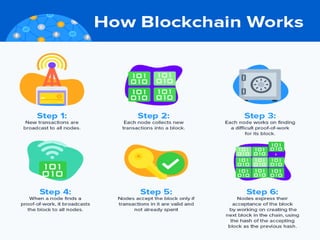Blockchain ppt
- 3. INTRODUCTION WHAT IS BlOCKCHAIN?? • A digital ledger in which transaction made are chronologically recorded without inclusion of any privacy WHICH IS PROGRAMMING LANGUAGE USED ?? • Solidity is a programming language that is intended for writing smart contracts for Ethereum-based blockchains. Solidity's syntax was based on JavaScript, which makes the language easier to pick up, and it also borrows concepts from C++ and Python .
- 5. HOW IT WORKS?? STEP 1: NEW TRANSACTION ARE BRODCAST TO ALL NODES
- 6. STEP 2: EACH NODE COLLECT NEW TRANSACTION INTO A BLOCK
- 7. STEP 3: EACH NODES WORKS ON FINDING DIFFICULT PROOF OF WORK FOR ITS NODE
- 8. STEP 4: WHEN A NODE FINDS A PROOF OF WORK IT BRODCASTS IT TO ALL NODES
- 9. STEP 5: NODES ACCEPT THE BLOCK ONLY IS TRANSACTION IS VALID AND NOT SPENT
- 10. STEP 6: NODES EXPRESS THEIR ACCEPTANCE OF BLOCK BY WORKING ON CREATING A NEXT BLOCK ON THE CHAIN USING THE HASH FOR ACCCEPTING BLOCK AS PREVIOUS HASH
- 12. HOW IS IT REVOLUTIONARY • Works for all kinds of transaction • Money • Goods • Property • Avoid frauds
- 13. INNOVATION BOUGHT BY BLOCKCHAIN • Sending Money Abroad Will Be Quicker • Buying A house Will Be Easier And Faster • It’ll Be Easier To Treat Health Problems • You’ll Be Able To Verify That What You Buy Is Genuine
- 14. TYPES OF BLOCKCHAINS • Consortium blockchains:-can be accessed by many companies • Private blockchain:-has public restrictions • Public blockchains:-has no public restrictions
- 16. ADVANTAGES/DISADVANTAGE OF BLOCKCHAIN ADVANTAGES • Greater transparency • Enhanced security • Faster transactions. • Increased efficiency and speed • Lower transaction costs. • It is reliable DISADVANTAGES • Human error. • Slow transaction times. • High cost for access. • High energy consumption. • Irreversible transaction. • Offers variety of language.
- 17. APPLICATIONS OF BLOCKCHAIN 1. Greatly enhances food safety. 2. Ensures fresh food. 3. Stops food fraud. 4. Cyber security: 5. Trustless system. 6. Immutability. 7. Digital voting. 8. Medical record keeping. 9. Weapons tracking. 10. Tracking prescription drugs. 11. Copyright and royalty protection.
- 18. WHERE ARE BLOCKCHAIN APPLIED • United Arab Emirates. • China. • Estonia. • US.
- 19. CONCLUSION • There is no need to panic about implementing block chain technology, but now its time to begin understanding what block chain technology does well and what it doesn’t do well. • For some industries, such as financial services and the supply chain industry, block chain based solutions will likely appear sooner than many other industries. • For block chain technology to be fully utilized it is necessary to educate people on the nature of technology. • Developers and companies working on block chain solutions need to actively engage policy makers in order to ensure proper regulation and useful legislation.




















